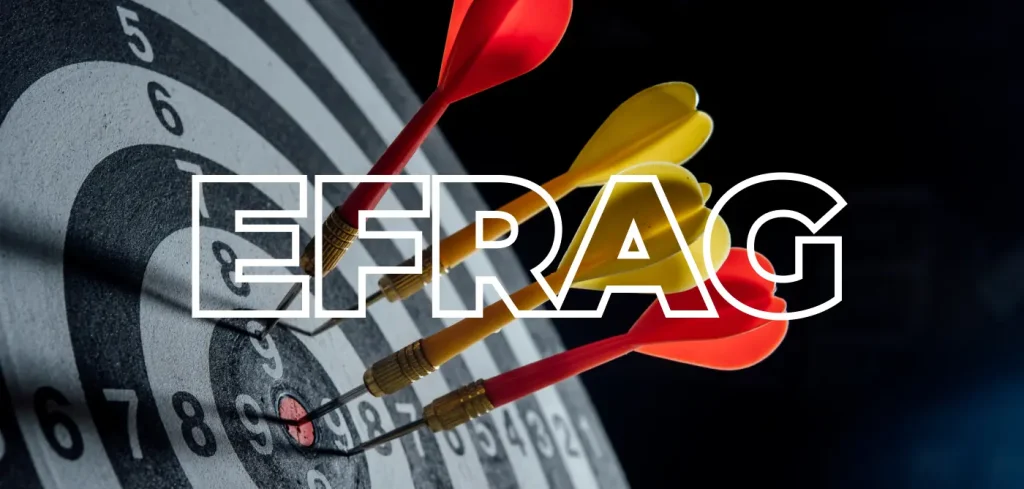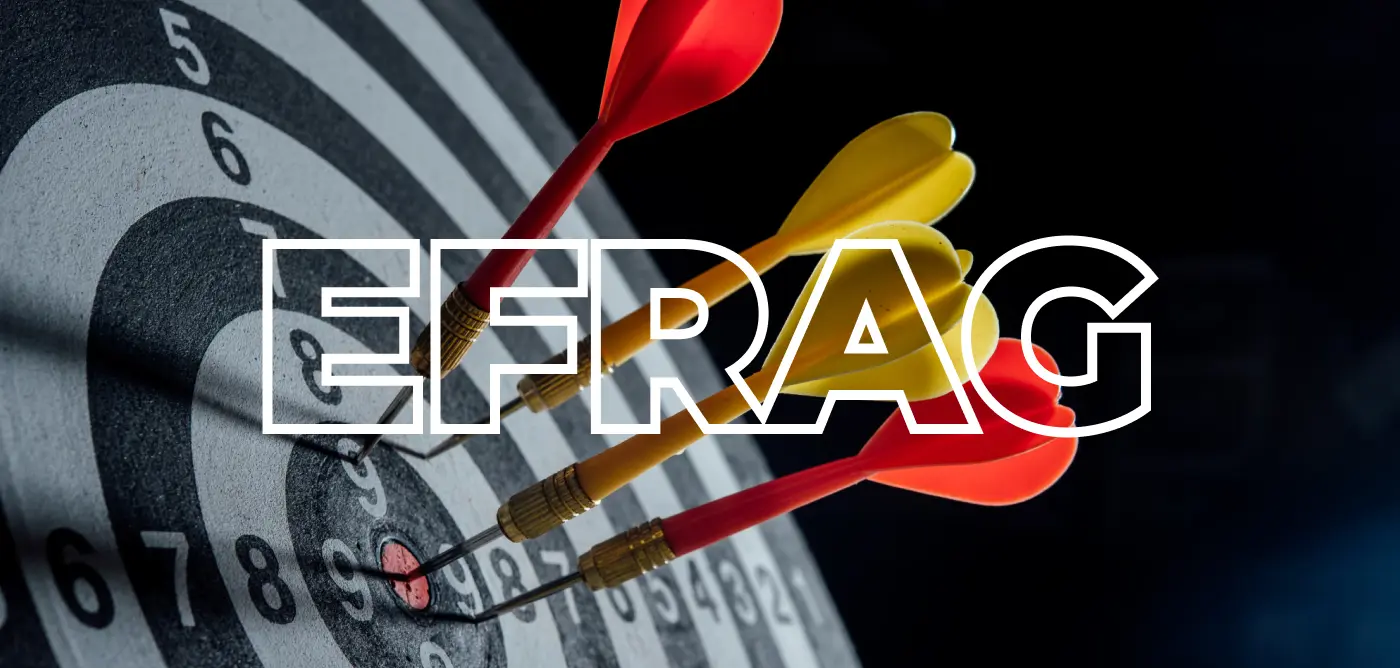
If you are immersed in the world of corporate sustainability or are just entering the field, you have probably heard of EFRAG, a key body in the development of standards and guidelines for the disclosure of non-financial information. But what exactly does EFRAG mean and how can it help your company advance its sustainability strategy?
EFRAG (European Financial Reporting Advisory Group) plays a key role in developing standards that enable companies to transparently report their social, environmental and governance impact. As well as being important for compliance with European regulations, applying these guidelines will also help you to position your company as a leader in sustainability. This will improve investor, consumer and stakeholder confidence in your company.
In this article, we will look at what EFRAG is, how it relates to ESG objectives and how you can integrate its guidelines into your sustainability strategy.
About EFRAG
Definition
As mentioned above, EFRAG (European Financial Reporting Advisory Group) is a European body responsible for advising the European Commission on financial and non-financial reporting. Its main function is to develop and promote standards that enable companies to report clearly, consistently and transparently on their social, environmental and governance impact.
Importance of EFRAG in corporate sustainability
EFRAG provides a framework for companies wishing to conform to best practice in sustainability. It works to ensure that companies comply with regulations, properly manage their environmental impact and contribute to global sustainable development goals.
EFRAG and international standards
EFRAG works closely with other international bodies such as the International Financial Reporting Standards Foundation (IFRS) and the Global Reporting Initiative (GRI) to develop standards that are aligned with global regulations. This collaboration enables companies to work within a coherent framework and comply with international transparency and sustainability standards.
EFRAG and the CSRD
EFRAG is responsible for developing the technical standards for the implementation of the CSRD (a European Union directive that aims to improve sustainability disclosures by companies). In other words, EFRAG is responsible for creating the specific standards and guidelines that companies must follow in order to comply with the requirements set by the CSRD. EFRAG works closely with the European Commission and other international bodies to ensure that sustainability reporting is consistent and aligned with global best practices. In summary, the relationship between CSRD and EFRAG is as follows: the CSRD sets out the obligation to report, while EFRAG provides the technical standards on how to do so effectively and consistently.
EFRAG’s areas of action
As a key body in the development of guidelines for corporate sustainability, EFRAG sets out three key areas of action that companies need to consider in order to conform to best practice and respond to the demands of an environment increasingly focused on transparency and social responsibility. These areas, covering governance and transparency, risk and opportunity management, and social and environmental impact, are essential for companies to comply with regulations and integrate sustainability principles into their long-term strategy. Below we look at these key areas of EFRAG, which guide companies on their path to greater sustainability and competitiveness.

Governance and transparency
EFRAG promotes sound corporate governance and transparency in decision-making, which encourages ethical and responsible practices within companies. It promotes greater visibility in the disclosure of key information on companies’ environmental, social and governance performance.
Risk and opportunity management
EFRAG also emphasises the identification and management of sustainability-related risks and opportunities. Companies must be proactive in addressing environmental, social and economic risks, and seize the opportunities that arise in a changing environment with increasing demand for sustainability.
Social and environmental impact
One of the core areas addressed by EFRAG is the assessment and management of the social and environmental impact of business activities. This includes reducing the environmental footprint, promoting corporate social responsibility and fostering a positive contribution to communities and social welfare.
How to apply EFRAG to your sustainability strategy
Integrating EFRAG into your company’s sustainability strategy is not only an act of compliance, but also positions you as a leading player in responsible and sustainable practices. Applying EFRAG guidelines will enable you to improve transparency and manage sustainability risks and opportunities more effectively. In this section we outline the three main steps to integrate EFRAG into your business strategy.
Assesses the current situation of the company
The first step in implementing EFRAG is to conduct a thorough assessment of your company’s current sustainability situation. To do this, you will need to identify which areas of your business already meet EFRAG standards and which areas need adjustment. This phase is key to understanding your starting point and defining what changes or improvements are needed to meet European and international sustainability expectations.
Set sustainable goals and targets
Once the assessment has been carried out, you should set clear and achievable objectives that are in line with EFRAG’s guidelines. These goals should be specific, measurable and in line with the company’s long-term strategy. Defining targets will facilitate compliance with EFRAG requirements, and provide your team with clear guidance to move towards greater sustainability.
Integrating EFRAG into strategic decision making
For EFRAG to become a reality, it must be integrated in a cross-cutting manner into strategic decision-making. This means that sustainability principles must be taken into account at every stage of the business planning process (resource allocation, project evaluation, etc.). Once EFRAG is integrated into the corporate strategy, decisions will be taken more in the long term.
Benefits of applying EFRAG
In addition to helping your company comply with EU regulations, the EFRAG guidelines offer a number of strategic competitiveness and reputational benefits. Below are some of the key benefits of integrating EFRAG into your sustainability strategy.
- Improving transparency and trust: In implementing EFRAG, companies should provide clear and accessible information on their sustainability performance. This increases transparency and strengthens the trust of investors, consumers and other stakeholders by showing the company’s commitment to good governance and sustainability practices.
- Regulatory compliance and alignment with regulations: EFRAG enables companies to conform to international rules and regulations, ensuring compliance with European and global standards. This helps to avoid sanctions and ensures consistency in reporting.
- Strengthening corporate reputation: Applying EFRAG contributes to strengthening the company’s reputation as a benchmark in sustainability.
Difficulties in implementing EFRAG
Implementing EFRAG in a company’s sustainability strategy can be complex. Despite the benefits it brings, there are some challenges. Below, we explain some of the most common obstacles and strategies that can help you overcome them.

Common obstacles to implementation
1. Lack of knowledge and expertise: Many companies lack staff with expertise in sustainability or EFRAG standards, which can make it difficult to properly implement the requirements. In addition, some organisations do not have the internal capacity to manage the collection and analysis of non-financial data, which delays the EFRAG alignment process.
2. Complexity of reporting: The reporting required by EFRAG can be complex, especially for companies that do not have a robust ESG data system. Collecting and organising information in the appropriate formats can be difficult, which can lead to a lack of consistency and transparency in reporting.
3. Internal resistance to change: Implementing EFRAG standards often requires a cultural change within the company. Teams may resist adopting new processes or collaborating on data collection, especially if they do not fully understand the importance of these actions for long-term success.
4. Limited resources: Many companies, especially small and medium-sized enterprises, may have limited resources to implement EFRAG. Investment in training, technology and specialised staff can be high, but is very important to ensure compliance and effective reporting.
Strategies to overcome these challenges
To overcome difficulties in implementing EFRAG, it is important to adopt a planned and organised strategy. Obstacles can be overcome with concrete actions that facilitate the adaptation process. Moreover, EFRAG is not just an obligation, but an opportunity to improve long-term sustainability and optimise the management of your company’s social, environmental and governance impact.
Among the actions that can be implemented, the following can be highlighted:
- Train and educate staff on EFRAG standards to ensure that all levels of the organisation understand their importance and application.
- Implement an ESG data management system, which will allow for more efficient collection and analysis of the necessary information.
- Involve senior management in the implementation process.
- Adequately plan the resources needed for integration, with budgets and allocation of specialised staff.
These actions will enable you to overcome obstacles and move towards a stronger sustainability strategy.
EFRAG is a key tool to improve corporate sustainability and to bring your company in line with international best practices in this field. Count on Maska for an efficient implementation of EFRAG guidelines. Our sustainability software streamlines the process of data collection and analysis, allowing you to transform sustainability reporting into an opportunity to create value and success. With Maska, your company will be positioned as a benchmark in sustainability, improving your investors’ trust and brand perception. We are waiting for you!





